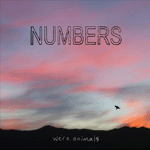|
|
 |
Dusted Reviews
Artist: Numbers Album: We're Animals Label: Kill Rock Stars Review date: Nov. 15, 2005 |

|
|
|
 |
We're Animals is the third album for the San Francisco party band Numbers, and the party is slowing down. Even the track listing says so: right there, last song, entitled “Party’s Over.” Sounds it, too – somber, syncopated, the word “Changes” sung over and over. After two records of sharp, danceable, abrasive edge (2002’s Life and its follow-up, In My Mind All the Time), the decals are starting to wear off. The scrape is still present, but the rhythms and arrangements are becoming more mature, ending their musical sentences with periods instead of exclamation points.
That’s not to say that We’re Animals is any sort of failure or lodged disappointment. As a band, they haven’t even hung up their old ways all the way, as evidenced by the jarring “Crows” and the rump-moving fracas of “The Fuck You Garage.” But on the Moog axis of pop, they’re skewing less towards Six Finger Satellite and more towards an asymmetrical version of the Rentals. Check “Desert Life” if you don’t believe; Dave Broekema trades his more violent guitar playing for largely Cars-esque chug, while Eric Landmark uses his Moog and custom-built Buzzerk controller as the bassline it was invented for, and Indra Dunis’ simple, solid drumming and sing-songy, basic vocals provide the narrative that buoys the track’s repetition. The same elements can be found in various permutations all over the record: on the Go-Go’s-esque ricochet of “I’ll Love You ‘til I Don’t,” and the epic storm and capture/release dynamic of “Black Crow Heart of Gold.”
This is a new Numbers, fresh for ’05, a bit more down (in the sense that they are down where many others are not) but not out. Their decision to alter their sound as a band trips a very sensitive wire, however; change is now part of their M.O., and as a result, they can’t make this record again. Fortunately for them, they’ve kept a sound that’s interesting enough to warrant following their lead for the foreseeable future.
By Doug Mosurock
|







